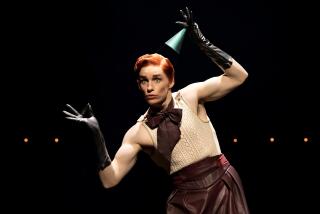MUSIC REVIEWS : Opera a la Carte in a Spirited Program
Only three months separate the premieres of Gilbert & Sullivan’s “Trial by Jury” and Rowe and Sullivan’s “The Zoo,” but the former represents a masterwork and the latter just a footnote to history.
Both these whimsical 1875 one-acts parodied the excesses of grand opera, but where Bolton Rowe (a.k.a. B.C. Stephenson) clumsily stitched two love stories together and added a few arbitrary choruses, W.S. Gilbert created a perfectly structured miniature courtroom drama that launched his wildly successful collaboration with Sullivan on longer operas.
Richard Sheldon’s Opera a la Carte company gave each work a spirited performance on Sunday at Ambassador Auditorium, with “The Zoo” receiving the more elaborate physical production and “Trial by Jury” more lapses into directorial overkill. Frank Fetta conducted briskly, with greater concern for vivacity than for the pseudo-operatic weight of some ensembles.
Sheldon’s staging of “Trial by Jury” embellished Savoyard traditions, but with “The Zoo” he seemed at a loss for ideas.
Patrick Gallagher sang with bright tone and the proper addled sincerity as Carboy. Teresa Brown exuded enough warmth and vocal sweetness as Eliza to compensate for a come-and-go accent. Jeff Dolan may have been more pompous than necessary as Thomas but sang with the smugness you’d expect from a nobleman-in-disguise. Apart from a few squally passages, Kathleen Conner chirped neatly as Laetitia.
Sheldon, of course, dominated “Trial by Jury” with his detailed, stylish, practiced portrayal of the Learned Judge. But Mark Beckwith also managed to impress with a dryly Gilbertian performance as Counsel for the Plaintiff. And Kris Kennedy husbanded slender vocal resources skillfully enough as Angelina to pass muster.
Unfortunately, Steve Parkin could scarcely be heard as the Defendant except when singing on the forestage. And Rollin Lofdahl played the Usher so like an insane Boyar that when the Judge commanded, “Get you, if you like, to Russia,” he seemed to be reviewing the performance.
The program opened with Fetta leading a persuasive account of the overture to “Iolanthe.”
More to Read
The biggest entertainment stories
Get our big stories about Hollywood, film, television, music, arts, culture and more right in your inbox as soon as they publish.
You may occasionally receive promotional content from the Los Angeles Times.










